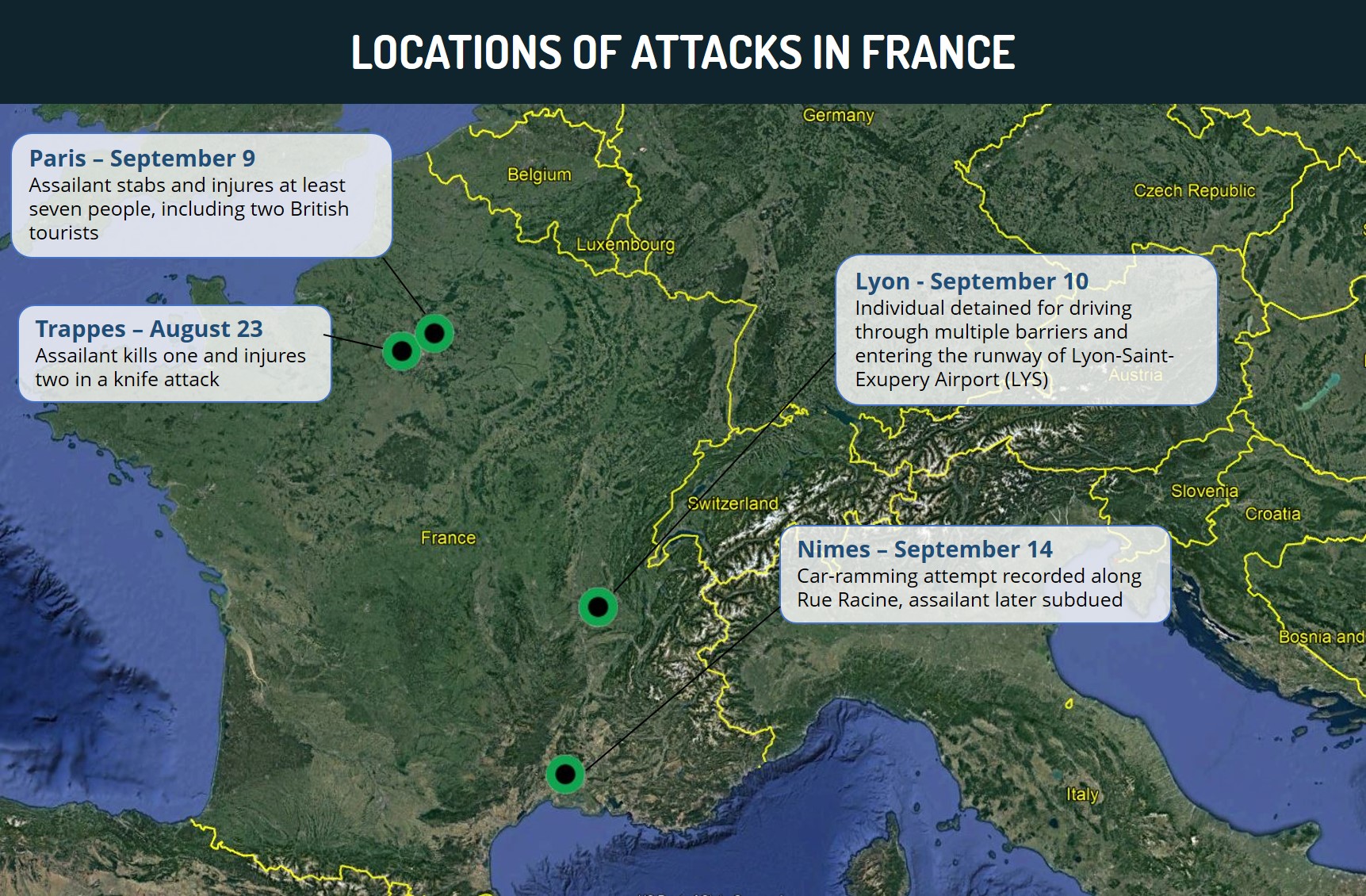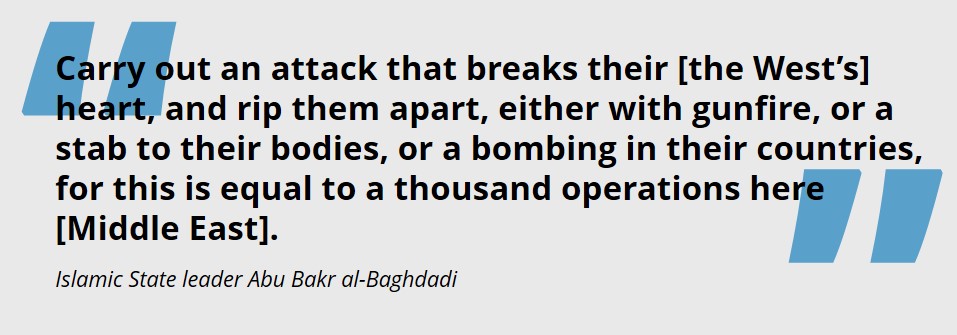Executive Summary
The uptick in stabbing and vehicular attacks in France bears a strong resemblance to previous Islamic State (IS)-inspired and linked attacks.
This wave follows the August 22 call to action from IS leader, Abu Bakr al-Baghdadi, who asked supporters to “strike the West” and emphasized vehicular attacks in particular.
IS appears to have been particularly successful in radicalizing young Muslim immigrants in France.
Authorities are likely downplaying the militancy links in order to offset the increasing media attention surrounding such attacks.
Travel to France may continue while remaining cognizant of the increased threat of militant attacks.
Current Situation
On September 14, a car-ramming attempt was recorded along Rue Racine in Nimes, southern France, during the early morning hours. The assailant reportedly intended to drive his car into pedestrians before being stopped by security barriers at around 01:30 (local time). The suspect was consequently subdued by locals in the area and later arrested by police. Reports quoting local eyewitnesses during the incident stated that the suspect shouted “Allahu Akbar”.
On September 10, an individual was detained for reportedly forcibly driving through multiple barriers and entering the runway of Lyon-Saint-Exupery Airport (LYS) in Lyon. The suspect was subsequently arrested following an extensive police pursuit. The incident caused significant delays and cancellations to flights. Following the arrest, a member of Lyon Prosecutor’s office reportedly stated that the assailant had alluded to a militant motive, claiming he was instructed to carry out the incident by Allah. However, this was later retracted.
The incident followed a September 9 stabbing attack in the 19th Arrondissement of Paris, when an assailant reportedly stabbed and injured at least seven people, including two British tourists, on Quai de Loire Street and Rue Henri Nogueres during the late night hours. The suspect was reportedly an Afghan national.
Authorities appeared reluctant to label all three attacks as being militant-related, calling the Nimes attack a “deliberate homicide”, and saying that the assailant who carried out the September 9 Paris stabbing attack did not appear to have militant motives. All three incidents were carried out by individuals of Muslim backgrounds and all three methods align with modus operandi that has been explicitly and repeatedly called for by the Islamic State jihadist group.
Background
On August 22, the (IS) al-Furqan media released an audio recording of the group’s leader Abu Bakr al-Baghdadi, who called upon the group’s supporters to “strike the West” through stabbings, bombings, and vehicular rammings, particularly emphasizing the last method. Al-Baghdadi then stated that “one such attack equals one thousand attacks in the Middle East and North Africa”.
On August 23, an assailant killed one and injured two in a knife attack in Trappes, Yveline, located 26 km from central Paris. The attacker reportedly shouted ‘Allahu Akbar’ and threatened police officers who arrived at the scene, and was later neutralized. Shortly after, IS-linked media reported that the assailant was a soldier of the Caliphate and conducted the attack in response to the group’s calls to “target the coalition countries”, referring to the US-led coalition of states that orchestrated a number of airstrikes against IS strongholds in 2014. Following the 2014 offensive, an IS spokesman had specifically singled out France as a target for future attacks.
Assessments & Forecast
Series of attacks likely lone-wolf incidents inspired by Islamic State methods and ideology, even if not ordered by IS in Middle East
Despite authorities’ reluctance to label the above-mentioned incidents as being IS-inspired militant attacks, various factors indicate that they may, in fact, have some connection to the group’s ideology and professed methods. In particular, the assailants resorted to stabbing and vehicular attacks in locations with a considerable civilian presence, which, in recent times, have been IS-linked lone-wolf actors’ chosen modus operandi. The assailants also chose to indiscriminately target these civilians and intended to cause widespread harm.
The known profiles of the attackers, who belong to immigrant communities who widely follow Islam, and the chanting of ‘Allahu Akbar’ during the attacks in at least two confirmed cases, is consistent with the details from similar previous IS-linked attacks. This lends credence to the possibility that the attackers’ actions were informed by a religious and ideological motive, in addition, it is equally likely that psychological instability also played a part in their motivations.
The link to IS is also strengthened by Baghdadi’s specific emphasis on the effectiveness of vehicular attacks in the August 22 call to action, which in turn was likely precipitated by the April 2018 airstrikes carried out by France and other countries in Syria, in response to the alleged use of chemical weapons by the state. In this case, the call was rather a wider propaganda piece, which was answered, and there is no evidence to suggest that any of the attackers had specific contact with IS in the Middle East or had been in touch with handlers.
Attacks likely catalyzed by individual feelings of disenfranchisement within community, which benefit IS’ recruitment
Due to the targeted locations being distant from one another, and absence of uncovered network between the suspects, it is likely that the attacks were not related, despite being conducted in quick succession. However, the attacks point to the potential success of IS propaganda and recruiting in France. The group has emerged as a viable outlet for Muslims who feel alienated from the wider community, exploiting feelings of disenfranchisement by offering them an alternative, in terms of belonging to the larger radical Islamist community.
Particularly, feelings of alienation among Muslim immigrants have likely been heightened by government policies such as the 2010 ban on religious face veils and head coverings, seen as being exclusionary, which have consistently prompted a backlash from both minority communities and their supporters, as well as anti-immigrant groups. Domestic factors such as a high unemployment rate and job discrimination against Muslims, religion-based tensions, as well as the general political culture of government criticism, also continue to contribute to making the immigrant population more susceptible to radicalization.
As has been seen in the past, IS also provides a useful narrative to psychologically-disturbed individuals, who then carry out copycat lone-wolf attacks using IS modus operandi, seeking to capitalize on media attention surrounding the IS ideology.
Authorities seeking to minimize impact of attacks through reluctance to make militant connection to avoid further media attention for such groups
Further, it is notable that authorities have not indicated that any of the September attacks were militant-related, despite suggestions, as evidenced above, that the assailants were at least influenced by IS, if not directly linked. This reflects a reluctance to label such lone-wolf attacks as Islamist militancy, possibly to discourage the media narrative against, and resultant disaffection within, Muslim immigrant communities in the country.
This unwillingness to attribute the incidents to militancy could also be a result of a conscious government decision to reduce the inadvertent aiding and abetting of IS’ operations, as the group has been known to use such official statements after attacks to legitimize itself as a threat to the West. Additionally, the government could be seeking to avoid heightened criticism of its security policy, especially amid the current administration’s declining public approval ratings.
FORECAST: IS’ online presence and recruitment methods, in addition to the persistent domestic factors alienating the Muslim community in France, the global trend of young men using mass violence as an outlet for psychological frustration, and IS has tapping into this trend to further its agenda, makes it likely that further such attacks will occur in France over the coming weeks and months. Given the apparent shift in executive security policy towards mitigating the media clout of militant attacks in general, it is likely that authorities will continue miIslamist islamist motives in such attacks.
Recommendations
Travel to France may continue while remaining cognizant of the increased threat of militant attacks.


